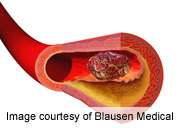The effect of psychological distress on clotting times and clotting factors varies in patients with venous thromboembolism and depends on whether or not they are receiving oral anticoagulant therapy, according to a Swiss study published in the August issue of the Journal of Thrombosis and Haemostasis.
(HealthDay)—The effect of psychological distress on clotting times and clotting factors varies in patients with venous thromboembolism (VTE) and depends on whether or not they are receiving oral anticoagulant (OAC) therapy, according to a Swiss study published in the August issue of the Journal of Thrombosis and Haemostasis.
Roland Von Känel, M.D., of the Bern University Hospital in Switzerland, and associates analyzed 190 patients with previous VTE to evaluate the effect of psychological distress on the international normalized ratio (INR) and clotting factors of the extrinsic pathway with (42 patients) and without (148 patients) OAC therapy.
The researchers found that the odds of a reduced INR (<1.00) were significantly increased by one standard deviation for symptoms of depression, anxiety, worry, and anger, after normal adjustments in VTE patients without OAC therapy. INR was found to be unrelated to a negative affect in patients with OAC therapy; these patients also showed lower levels of clotting factors.
"Psychological distress was associated with a reduced INR in VTE patients without OAC therapy," the authors write. "The direction of the association between psychological distress and activity in some clotting factors of the extrinsic coagulation pathway might differ depending on whether VTE patients are under OAC therapy or not."
More information:
Abstract
Full Text (subscription or payment may be required)
Copyright © 2012 HealthDay. All rights reserved.






















